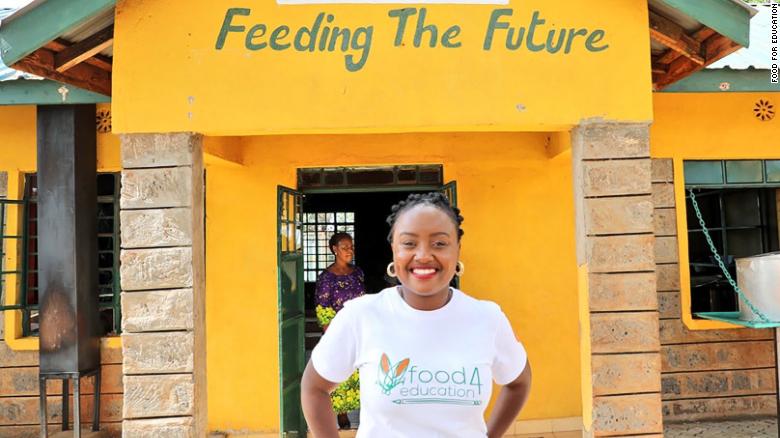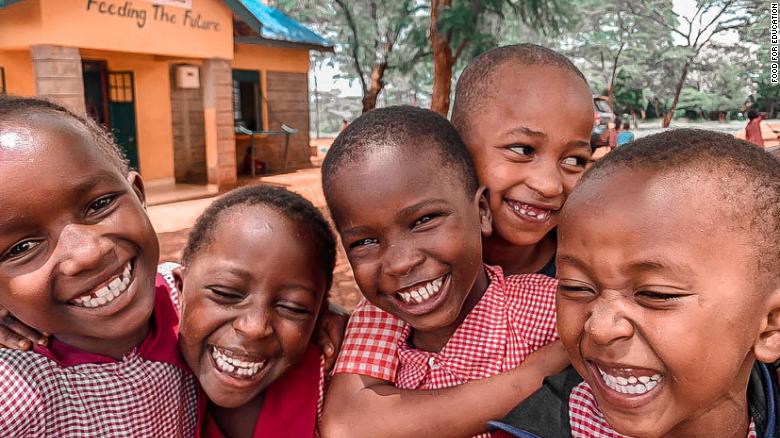

Due to the COVID-19 pandemic, schools across the world are closed, leading to children without access to meals. However, a non-profit named Food for Education was founded by Wawira Njiru, a nutritionist who grew up near the Kenyan capital, Nairobi. Their mission is to supply inexpensive and fulfilling lunches to poor primary school children and has provided over a million meals. Amazingly, Njiru's program only costs $2 per week to feed one person and has developed into a 24-hour kitchen that delivers food to 13 schools. The lunches consist of rice, beans, maize, and other vegetables that contain nutrients that are important in a child's development. After the coronavirus is under control, Njiru has plans to expand the program and open a second kitchen, which would increase the non-profit's reach to 30,000 children.
1. What are ways people in the USA can help support efforts around the world to mitigate damage/chaos resulted from Corona?
2. By 2025, Njiru wishes to reach a million kids a day. Is this goal realistic, and what can the program do to make that goal?
3. How are the meal programs in San Mateo similar/different than Food for Education?
https://www.cnn.com/2020/04/24/africa/kenyan-keeping-children-fed-lockdown-spc-intl/index.html
Some ways people in the USA can help is by donating non perishables, face masks, cleaning supplies, donating money to other foundations or organizations that are helping provide supplies etc. Meal programs in San Mateo are similar to Food for Education as they both provide food for people who need it. The only difference is some San Mateo meal programs offer free meals or reduced prices while the Food for Education has a set price of $2 which is still cheap compared to other prices.
ReplyDeletei think that the US showing support to the organization and giving aid to them can be very helpful. they can help by donating money to help them start new kitchens so they can reach and feed more kids. I also think that they can give support by donating non perishable foods. similar to the organization in Kenya, the San Mateo schools are working to help give lunches to those who usually get lunch from school a nutritious meal during the day. it is different because it is a school run program and is not run by an outside organization.
ReplyDeleteFunds can be allocated to the many incredible non-profit organizations around the world which provide direct services and relief services such as food and sanitation items. Additionally, items such as canned food can be donated in large quantities in order to distribute to the children. For Njiru to reach helping 1 million children is a massive goal, and depends on whether they want to expand into helping children all across the world or only in one country, and on the amount of volunteers/employees which they are able to have. Here San Mateo schools provide free lunches to students who need them, but it probably costs more than two dollars here to support an individual with a meal.
ReplyDeleteI believe that Njiru's goal of 1 million children by 2025 is doable, but it will take a lot of hard work and time. I think one way that the US can help with the effects of Corona in other countries is donating not to the country, but to companies within countries that can better help the people who live there.
ReplyDeleteUS support and aid is very beneficial for the organization. Donating money and food can go a long way and help many lives, families and communities.
ReplyDeleteAmericans can help support Njiru's cause by spreading the word and donating funds to organizations like hers that feed hungry kids during this crisis. Although her goal of reaching 1 million kids within 5 years seem realistic, with some hard work and support I believe she can do it. I am sure people like her will be rewarded and recognized for their work after COVID ends.
ReplyDeleteThere are many ways people in first world countries can help those less fortunate than they are. They can raise awareness and funds, they can donate to charity, they can protest certain companies based on the type of labor they use, and they can speak where those people cannot as a form of representation. I think the goal is realistic, but only if certain measures are taken to help her. One woman is more than capable but not without support and help from others. There is always something bigger that needs to be in place for these charities to be successful. The meal programs here are similar in that they feed those in need during school hours but different in that this is a non-profit organization. The San Mateo food system is government run.
ReplyDeleteI think the goal of being able to feed 1 million people by 2025 is realistic, as long as funding and resources for the project do not run out. Having help from other countries such as the US and neighboring countries could assist Njiru achieve that goal, because other rich countries have more resources to spare.
ReplyDeleteFood for Education has delivered over one million meals and the Samaritan House (San Mateo) gives out around 1,375,622 meals annually. Including hot meals, the Samaritan house also gives out bags of groceries. The Samaritan House has programs including their after school snack program, summer lunch program, mobile meals, and a food pharmacy, in addition to their dining room, whereas Education for Food which was just recently started I believe only has a delivery service. Food for Education also targets primary school kids and the Samaritan House provides food for children, families, and seniors. Both have the amazing goal to help those in need get the food and nutrition they need, but one is just more well established and older than the other.
ReplyDeleteSources: https://samaritanhousesanmateo.org/service/food/
https://food4education.org/
The US can support efforts worldwide by funding more money into NGOs so they can distribute the aid to poor people in need. They can also set up good communication between governments and local groups in the area, as the local groups are better suited for the needs of the people. This way, through inter-group cooperation, Kenyan schoolchildren and others around the globe can be helped.
ReplyDeleteThe US support for the organization is widely appreciated and beneficial. The help from other countries including the US could allow this organization to reach its goal of feeding one million kids everyday. Even without the terrible circumstances of Corona is not a singular factor for hunger in this world. Therefore, I believe we must continue to support other countries even after Corona "ends".
ReplyDeleteThe work that Njiru is doing to feed more kids who lost their usual meal source when schools closed is super necessary work. There is so much suffering as a result of this pandemic, so small things like this organization that attempts to feed as many children as possible are extremely important. It would definitely be helpful to expand this program to more kids after this pandemic, as long as the quality and nutrition of the food remains similar to how it is currently.
ReplyDeletePeople in the U.S can support efforts around the world can help to mitigate damages due to the coronavirus by donating anything that they can to help people who have been effected by the virus. I think that their goals are realistic if they can get enough support for their efforts financially and politicly. Food programs in San Mateo and Food for Education are different because it is in two different places with different situations.
ReplyDeleteI think the goal to feed a million kids a day by 2025 os very ambitious but it is also possible. It all depends on the generosity of people round the world and how much they donate to this cause. It is really a cumulative effort and if the world works together it is very possible that by 2025 there will be a million less children going hungry every day
ReplyDeleteBy donating supplies such as face masks, non perishables and/or money, the U.S. would be greatly supporting this organization. Njiru's goal may seem unrealistic to some, but I believe that with full support and help from donations, it is reachable. It is important to spread the word with organizations like these so that they are able to reach their goal and go beyond that.
ReplyDeleteI think that Nijiru's goal of reaching 1 million children is possible, depending on how fast the program expands in the next few years. Being that he has yet to reach 30,000 children, the stakes are very high. In order to achieve this goal, Nijiru must find ways to acquire more workers to work in newly built kitchens, as well as expanding the deliveries to more schools.
ReplyDelete